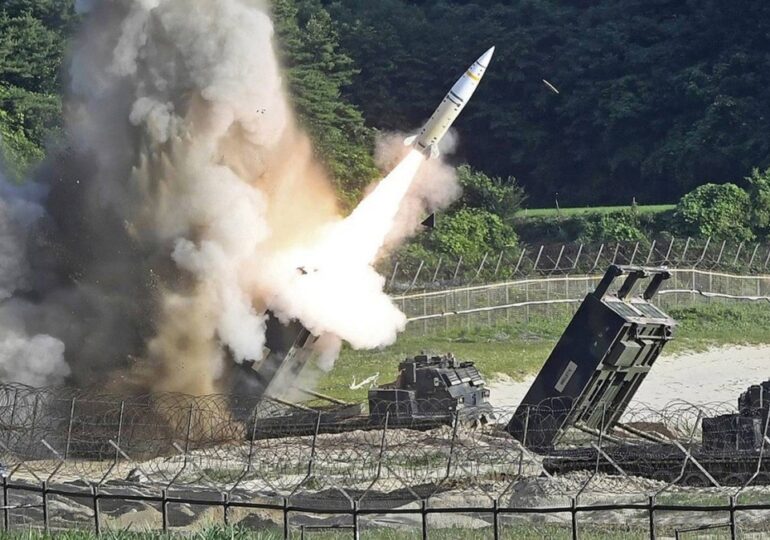President Joe Biden’s decision to authorize Ukraine to carry out long-range strikes in Russia with American weapons has sparked intense debates. Experts are analyzing the potential implications of this change in the US administration’s policy.
After receiving permission from across the ocean to strike in Russia, Ukraine launched American ballistic missiles ATACMS at an enemy ammunition depot.
The strike came on the same day Vladimir Putin signed a decree stating that Russia reserves the right to use nuclear weapons if attacked, even with conventional arms.
The Biden administration's decision has elicited different reactions.
Russia has warned that Ukraine's attacks with American missiles could lead to World War III.
And Donald Trump Jr. has stated that the decision could contribute to a major conflict before the elected president takes office in January. "The Military-Industrial Complex seems to want to make sure it starts World War III before my father has a chance to create peace and save lives," wrote X, the eldest son of Donald Trump.
Experts consulted by Newsweek have differing opinions on the effects of the White House's decision.
A Dangerous and Useless Decision
Michael C. Desch, a professor of International Relations at the University of Notre Dame, believes the decision is dangerous and useless.
"It is dangerous because I think the use of deep strike systems like ATACMS may require direct involvement of the US/NATO, primarily in targeting. I doubt it will lead to World War III, but it will further escalate a bloody and dangerous war that should never have happened and should have been closed long ago," he said.
- What we know about the ATACMS missiles Ukraine is authorized to use for attacks on Russian territory
The decision is also useless because "it is unlikely that the West will provide Ukrainians with a sufficient number of such systems to change the course of the war on the ground, which the Russians probably will win at this point," Desch believes.
"The optimistic view of President Biden's decision is that he hopes to find leverage against the Russians in the inevitable negotiations that will end this war. The pessimistic view is that he may be trying to tie the hands of his successor, Donald Trump, who will likely adopt a very different policy towards Ukraine," he appreciates.
In any case, "the West is playing with fire," says Michael C. Desch.
We Are Already in World War III
Robert Romanchuk, a researcher at the Harvard Ukrainian Research Institute, is more decisive and states that World War III has already begun.
"It is possible that Americans may not have noticed - and, shockingly, neither have many Europeans - that World War III has already begun. On one side are Russia, China, Iran, and North Korea. Russia's war in Ukraine is conducted with China's support for the Russian industry, Iranian drones and ammunition, and North Korean missiles and ammunition, which kill Ukrainian civilians every night, and now with North Korean troops.
On the other side are Ukraine and even Western democracies," Romanchuk points out.
In his opinion, if Russia wins in Ukraine, there is no doubt that the hot war will move to the Baltic states or Poland, "the few states in Europe that fully understand what is happening."
Russia's list of "red lines" is endless, but when Western democracies cross them, Moscow often retreats. Every new shipment of arms to Ukraine has been met with warnings from the Kremlin, but those arms have been delivered repeatedly, and Russia has not resorted to major reprisals, explains the expert.
Romanchuk cites Finland and Sweden's NATO accession as an example of crossing a red line, when Russia did nothing. "Russian leaders care too much about their wealth and hope too much to reclaim their villas in Europe to launch nuclear weapons."
Putin Will Not Do Anything Serious Because He Has an Interest in Waiting
Richard K. Betts, an expert in International Relations and author of the book "American Force," says that at this moment the risk of a major escalation by Russia to an ATACMS attack is low because Putin has an interest in waiting a few months for Trump's installation and, consequently, the change in US policy towards Ukraine.
Professor Lubomyr Luciuk from the Royal Military College of Canada supports the Biden administration's decision: "Providing Ukraine with all the necessary weapons to defeat the Russians will defuse this conflict and prevent a world war. Failing to do so will cede ground to 'powers and principalities' seeking to undermine the rules-based international order and exacerbate global geopolitical instability."
Ensuring Ukraine's victory is "the antidote to Russia's predatory behavior," he emphasizes.
On the opposite end is Dani Belo, Director of Security and International Relations at the Global Policy Horizons Research Lab. In his view, Ukraine's ability to now strike Russian territory has the potential to escalate the war with Russia. However, the choice of Donald Trump will likely mitigate this escalation.
"From Russia's perspective, there is currently no incentive for escalation. Moscow believes that the Trump administration will seek to end the war quickly, so it is possible that the Kremlin will adopt a 'wait and see' approach until the new presidential administration enters the White House without substantial escalation. This means that any escalation could be restrained," the expert believes.

